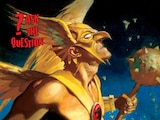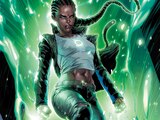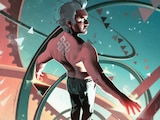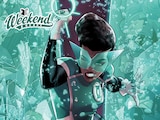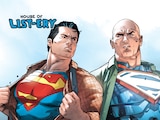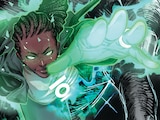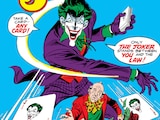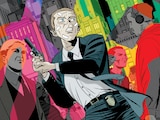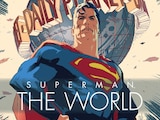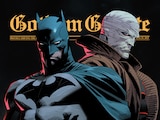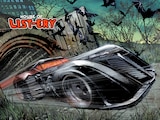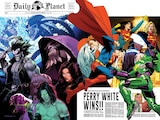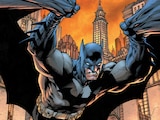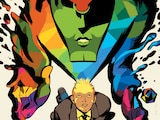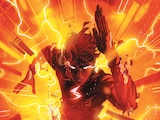We conclude our month-long salute to DC in the 1990s with an introduction to the most ’90s thing which ever existed. Something that was so of the era that even though it didn’t even start at DC Comics, DC couldn’t help itself but have it. We speak of the publishing house which took Jim Lee from a superstar artist into the biggest name in publishing: WildStorm Comics.
What’s a WildStorm?

The DC Super Dictionary defines “WildStorm” as “rude, crude, and a whole lotta ’tude.”
Okay, it doesn’t, but it should. WildStorm was a company founded in 1992 with the ideals of its era—nonstop action, wild superpowers, huge weapons and quippy one-liners. Every story was a Schwarzenegger or Stallone movie if it had ten times the budget and ninety times the CGI. Not content to introduce you to its core cast of characters one at a time, WildStorm’s bread-and-butter were team books, giving you a full course of new characters at once. Occasionally, one of the more popular team members, like WildC.A.T.s’ Grifter or the Authority’s Midnighter, would break out into their own solo title, but the main WildStorm line was always about the team.
Meet The Teams

WildC.A.T.s and Wetworks
Okay, the name “WildStorm” is actually derived from its two flagship launch titles, WildC.A.T.s and Stormwatch. The WildC.A.T.s, or “Covert Action Teams,” were a peacekeeping force embroiled in a millennia-spanning war between two powerful, shapeshifting alien races which have formed the backbone of every world culture’s mythology since the dawn of civilization: the evil Daemonites and the ostensibly good (but honestly still pretty sketchy) Kherubim. You had Cole Cash, aka Grifter, a gunman and wiseguy who’s the closest thing the story has to a protagonist. Voodoo, a telepathic dancer. The stoic warrior Zealot, the stoic (but more modern) warrior Spartan, the alternatingly super-intelligent or super-strong Maul, the living weapon Warblade, the telepathic Void and the mysterious Lord Emp, who sets the entire plot in motion. Most members of the team were somehow connected to the Kherubim, if not partially or completely Kherubim themselves, and opposed an equally clandestine faction of Daemonites called “The Cabal” led by a nasty creature named Lord Helspont (basically the devil from space).
The whole affair is a pretty X-Treme X-Perience, if you get our meaning. Wetworks, or “Team 7,” gives us more backstory on a few of WildC.A.T.s’ more human members and functions as WildStorm’s own answer to DC’s Suicide Squad of government black ops who do the dirty work.

Stormwatch and The Authority
Stormwatch was WildStorm’s approach to a more traditional super-team—a union of super-powered protectors defending the Earth and working with the government. Its hook, at least initially, was how it endeavored to be truly multicultural, with a roster representing nations around the world.
But from Stormwatch, an even more radical team of heroes would emerge—one who called themselves the Authority, as they declared themselves the ultimate arbiters of right and wrong. Creating a better world by any means necessary, up to and including force, seems like an easy angle for a team of villains. But what if they weren’t really the bad guys? Is the act of enforcing control inherently fascistic, or is it justified when the benefit is to the public, whose lives are controlled through other means? As a story of what happens when those with powers refuse to content themselves with enforcing a status quo, The Authority remains one of WildStorm’s most interesting books.

Gen13 and DV8
Gen13 and DV8 were sort of the junior Stormwatch and Wetworks, or maybe more like Young Justice and Blood Syndicate.
The other major WildStom arc apart from the Kherubim-Daemonite war was the “Gen-Active” experiments, conducted in secret by world governments to develop genetically enhanced superpowers. Gen13 were named for being the young 13th generation of these experiments, but they refuse the yoke of their masters and find solace in each other, using their powers as they can to protect the world.
DV8 essentially has the same deal, but the hook is that they’re actually teenagers about it. DV8 was sexier, bloodier and utterly hedonistic in their pursuit of entirely selfish goals. They’re a team of kids who can barely stand each other but don’t really have anyone else. If you’re looking for reality show drama with explosive superpowers, this is where you’ll find it.

Imprints and Special Projects
Like DC’s Vertigo, WildStorm had its own branch of creator-owned, independent projects that enriched its line. Award-winning titles like Ex Machina, which contextualized the superhero genre for a post-9/11 America, Astro City, a powerful and optimistic reconstruction of superheroes after a decade of deconstruction, and even Strangers in Paradise, a mature take on the teen romantic comics genre. They did a fair share of media tie-in work too, as is the tendency of many comic publishers looking to make their stake. But the crown jewel of WildStorm’s imprints was America’s Best Comics, Alan Moore’s home for comic book storytelling from The League of Extraordinary Gentlemen to the pulp fiction-inspired world of Tom Strong.
One of WildStorm’s final projects as an independent company before its full integration into DC was its digitization department. In 2010, WildStorm saw the value in digitizing their collective comic book library and began work digitally preserving both WildStorm and DC comics in the highest possible quality. It’s for this reason you’ll occasionally see the “Converted by WildStorm” mark on our comic collection at DC UNIVERSE INFINITE.
So…Is It Canon?

Well, that’s a tough question. After WildStorm’s acquisition by DC and prior to 2011’s The New 52, WildStorm was shown to exist in the DC multiverse as “Earth-50.” This would occasionally allow DC heroes to visit the WildStorm universe and vice versa, such as in Captain Atom: Armageddon.
In 2011, The New 52 integrated the heroes and characters of WildStorm into DC continuity for the first time, placing Martian Manhunter as the new leader of StormWatch, posing Helspont as a new enemy of Superman, and positing Midnighter as a friendly rival to Nightwing. Post-Rebirth, that reality shifted. Yet there still remains some as-yet unnumbered universe where WildStorm exists on its own, and even features alternate versions of DC’s own heroes—as seen in 2017’s The Wild Storm, and particularly its Michael Cray spinoff.
That’s not to say WildStorm characters don’t exist on Earth-Prime within DC’s core continuity, however. With Cole Cash and company starring in a brand-new WildC.A.T.s series crossing them with the Court of Owls, and the heroes of Grant Morrison’s re-established Authority forming the backbone of Superman’s supporting cast in Action Comics for the past two years, WildStorm has been getting as strong a representation in DC comics as it’s ever had. So, if you love the ’90s as much as DC, rest well that WildStorm intends to keep them alive.
WildStorm 30th Anniversary Special #1, featuring 100 pages of new and reprinted WildStorm stories from a dream team of writers and artists, is now available in print and as a digital comic book.
Alex Jaffe is the author of our monthly "Ask the Question" column and writes about TV, movies, comics and superhero history for DC.com. Follow him on Twitter at @AlexJaffe and find him in the DC Community as HubCityQuestion.

